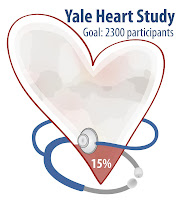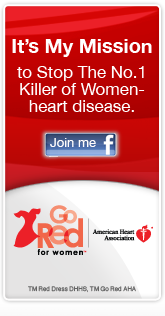I said something like this to my husband around 8:30 a.m. on a Sunday morning, after I’d spent the whole night awake, whimpering in pain and popping Advil four at a time. Once I finally told him how I was feeling and we decided I had “better get checked out,” I didn’t call 911 or rush to the ER.
Nope. I ate breakfast, helped pack for camp, took a shower, styled my hair, supervised a pre-schooler potty break, and put on makeup. For my date. With a heart attack.
Why do people who suspect they are sick or in danger delay seeking help to attend to family, work, pets, or in my case, my hair? That is the question that a group of researchers at Yale University are trying to answer through the Yale Heart Study.
I took the study myself about a month ago. Funded by the National Institutes of Health, it is a simple online survey designed to understand why people wait, on average, four hours to go to the hospital when having heart attack symptoms. If you are a member of the heart disease awareness community (I am now, of course, card-carrying), you know that “time is muscle.” Every minute counts.
The problem is, heart attacks can be sneaky, particularly in women, and it is not unusual for people to mistake heart attack symptoms for indigestion, heartburn (my excuse of choice), anxiety disorders, fatigue, or asthma. Add to that our tendency to put everything and everyone else first.
Here’s how the study’s primary investigator, Dr. Angelo A. Alonzo, describes it:
We are so embedded and invested in our daily lives that we are very, very reluctant to just drop everything and seek medical care. We have to be certain it is a real problem, we have to finish the task at hand, we need to make arrangements if we are hospitalized, we have to cancel appointments, our work activities are important to our identity, and we are too strongly tied to our social obligations to just leave them. . . only when the signs and symptoms become so overwhelming do we willingly go.
 The idea behind the study is to understand why individuals like me make the decisions they do. With this knowledge, an effective intervention strategy can be devised to get people to the hospital faster. Says Dr. Alonzo: “The irony is that one gets the most therapeutic benefit if one is in the hospital within the first hour of acute symptoms onset.”
The idea behind the study is to understand why individuals like me make the decisions they do. With this knowledge, an effective intervention strategy can be devised to get people to the hospital faster. Says Dr. Alonzo: “The irony is that one gets the most therapeutic benefit if one is in the hospital within the first hour of acute symptoms onset.”
If you or someone you know has had a heart attack, please encourage them to take the study. It may save someone else time and muscle, or quite possibly, their life.
For more information, visit https://heartstudy.yale.edu/hacs/ or email heart.study@yale.edu.



Thank you for creating and maintaining this blog!